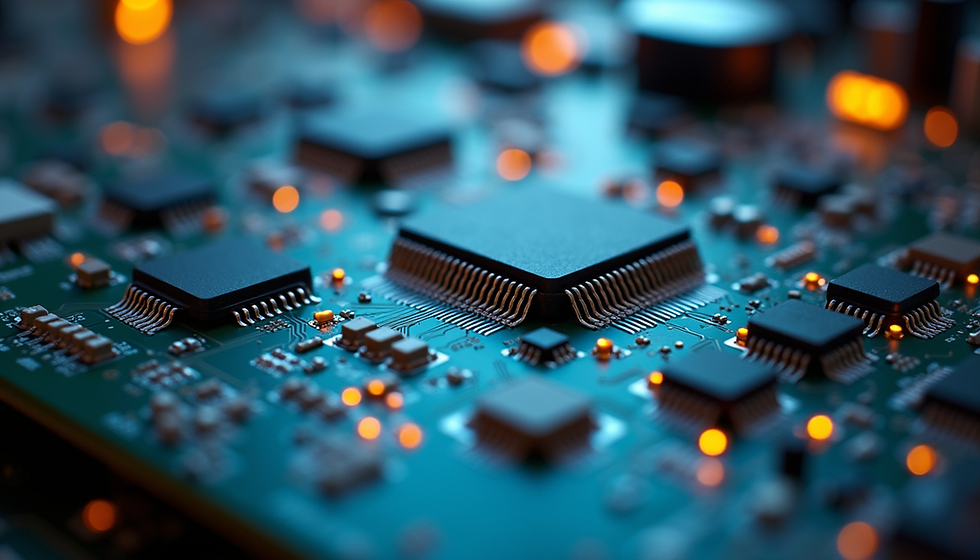Understanding the Impact of Industrial Transformation
- Sachin Athani

- Aug 25, 2025
- 4 min read
The landscape of industry is evolving at an unprecedented pace. Modern industrial changes are reshaping how businesses operate, innovate, and compete globally. For sectors like railway systems, avionics, and connected infrastructure, these shifts are not just trends but critical transformations that demand agility, precision, and forward-thinking solutions. Companies that harness these changes effectively position themselves as leaders in deeptech innovation, driving safer, smarter, and more efficient operations.
Embracing Modern Industrial Changes: A Strategic Imperative
Modern industrial changes are characterized by the integration of advanced electronics, embedded systems, and digital technologies into traditional industrial processes. This evolution is powered by breakthroughs in artificial intelligence, IoT, automation, and data analytics. For enterprises in deeptech and railway sectors, adapting to these changes means more than upgrading equipment—it requires reimagining entire workflows and product designs.
For example, the deployment of intelligent control systems in railways enhances safety and operational efficiency. Products like the Kavach System (Train Collision Avoidance System) and its sub-systems such as DMI (Driver Machine Interface) and SMOCIP (Station Master's Operation-cum-Indication Panel) exemplify how innovation translates into real-world impact. These solutions not only prevent accidents but also optimize train operations, reducing downtime and maintenance costs.
Key benefits of embracing modern industrial changes include:
Enhanced safety and reliability through real-time monitoring and control
Increased operational efficiency with predictive maintenance
Scalability and customization to meet diverse industrial needs
Export-ready technologies that meet global standards

What is the industrial transformation?
Industrial transformation refers to the comprehensive shift from traditional manufacturing and operational methods to digitally enabled, automated, and interconnected systems. This transformation leverages cutting-edge technologies to improve productivity, safety, and sustainability across industries.
At its core, industrial transformation involves:
Digitization: Converting analog processes into digital formats for better data capture and analysis.
Automation: Using robotics and intelligent systems to perform repetitive or hazardous tasks.
Connectivity: Linking devices and systems through IoT to enable seamless communication and control.
Data-driven decision-making: Utilizing big data and AI to optimize operations and predict failures.
In the railway sector, this transformation is evident in the adoption of embedded systems that monitor train health, control signaling, and manage communication interfaces. These technologies ensure that rail networks operate with minimal human error and maximum efficiency.
For instance, Seloriz’s expertise in developing embedded electronics tailored for railway safety demonstrates how industrial transformation is not just theoretical but actively shaping safer transport infrastructure.

Driving Innovation with End-to-End Engineering Solutions
The complexity of modern industrial changes demands a holistic approach to product development. From research and development to deployment and maintenance, companies must deliver solutions that are robust, scalable, and tailored to client needs.
Seloriz exemplifies this approach by offering end-to-end engineering services that cover:
Conceptualization and design: Collaborating with clients to understand requirements and create innovative product blueprints.
Prototyping and testing: Rapid development of prototypes followed by rigorous field testing to ensure reliability.
Manufacturing and integration: Seamless production and integration of products into existing systems.
After-sales support: Continuous monitoring, updates, and technical assistance to maintain peak performance.
This comprehensive service model accelerates time-to-market and reduces risks associated with deploying new technologies in critical sectors like railways and industrial electronics.
Moreover, the ability to customize solutions such as SMOCIP and DMI to specific operational environments highlights the importance of flexibility in modern industrial changes. Clients benefit from products that not only meet current standards but are also future-proofed for evolving requirements.

Practical Recommendations for Navigating Industrial Changes
To thrive amid modern industrial changes, businesses should adopt a proactive and strategic mindset. Here are actionable recommendations:
Invest in R&D: Prioritize research to stay ahead of technological trends and develop proprietary solutions.
Collaborate with deeptech partners: Engage with specialized companies that offer expertise in embedded systems and electronics.
Focus on scalability: Design products and systems that can grow with operational demands and integrate new technologies.
Implement rigorous testing: Ensure all solutions undergo thorough validation in real-world conditions to guarantee safety and reliability.
Leverage data analytics: Use data insights to optimize maintenance schedules, reduce downtime, and improve decision-making.
Adopt modular designs: Facilitate easier upgrades and customization to adapt to changing industry standards.
By following these guidelines, enterprises can transform challenges into opportunities, driving innovation and operational excellence.
Shaping the Future of Industrial Electronics and Railway Safety
The future belongs to those who can seamlessly blend technical precision with practical application. Companies like Seloriz are at the forefront of this movement, delivering indigenous, scalable, and export-ready technologies that redefine railway safety and industrial electronics.
Their passion for innovation, combined with a client-focused approach and quick turnaround times, ensures that complex ideas become tangible, reliable products. This commitment not only enhances safety and efficiency but also builds trust among partners and stakeholders.
As industries continue to evolve, embracing modern industrial changes will be essential for maintaining competitiveness and achieving sustainable growth. The integration of advanced embedded systems, intelligent communication interfaces, and comprehensive engineering services will drive this evolution forward.
In this dynamic environment, partnering with a deeptech innovation powerhouse can make all the difference in transforming vision into reality.
Explore more about how industrial transformation is revolutionizing sectors and discover solutions tailored for your business needs.







Comments